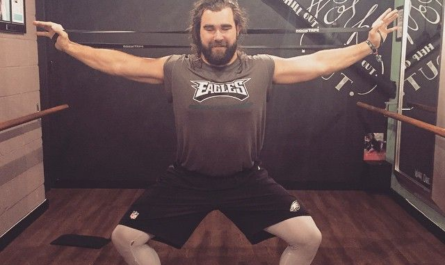# How Mental Health Struggles Shaped Travis Kelce’s Career
Travis Kelce has established himself as one of the best tight ends in the NFL during his 8 seasons with the Kansas City Chiefs. However, his journey to the top has not been easy. Behind the success, Kelce has faced significant mental health struggles that have both challenged and driven him throughout his career. Through openness about his experiences and advocacy for mental health awareness, Kelce has helped reduce stigma for other athletes who struggle. His story is one of perseverance in overcoming adversity.
## Early Struggles
Kelce’s mental health issues began developing in college at the University of Cincinnati. He joined the Bearcats football program in 2008 as a highly touted recruit, but struggled with the pressure of living up to high expectations at the Division I level.
“I was really anxious and depressed my whole time in college,” Kelce said in a 2020 interview. “There was so much pressure to perform at a high level every week against great competition.”
The transition from high school to major college football proved difficult for Kelce both on and off the field. He also had to deal with the loss of his father, Edward, who passed away from cancer when Kelce was in high school. Without his father’s support as he entered this new challenging phase of his life, Kelce felt very alone.
“Losing my dad right before going to college was really hard,” Kelce said. “I didn’t have that father figure there to lean on when times got tough. I bottled a lot of emotions up which just made the anxiety and depression worse over time.”
Kelce found it difficult to manage the physical and emotional demands of being a Division I athlete while also grieving the loss of his father. He started experiencing panic attacks before and after games as well as bouts of deep sadness and isolation. His mental health issues began affecting his performance on the field.
## Seeking Help
After his junior season at Cincinnati, Kelce realized he needed to address his mental health struggles head-on if he wanted to maximize his football potential. He started seeing a therapist and was eventually diagnosed with generalized anxiety disorder and clinical depression.
“That was when everything started to make sense,” Kelce said. “I wasn’t just stressed or sad occasionally – I was dealing with real mental illnesses.”
His therapist helped him understand what was happening in his brain and how to manage his conditions. Kelce was also prescribed antidepressant medication which helped regulate his moods and lessen his anxiety symptoms.
In addition to therapy and medication, Kelce made important lifestyle changes. He focused on eating healthier, prioritizing sleep, exercising regularly, and spending time with supportive friends and family. These holistic approaches helped him maintain wellness both mentally and physically.
The steps Kelce took marked a turning point in his journey. With professional help, he was able to get his anxiety and depression more under control which allowed him to focus fully on football once again. His performance improved dramatically his senior year at Cincinnati after seeking treatment.
## Advocacy Begins
After being drafted by the Chiefs in the 3rd round of the 2013 NFL Draft, Kelce has become one of the most productive tight ends in the league. He has made the Pro Bowl in 6 out of the last 7 seasons and helped lead the Chiefs to 2 Super Bowl appearances.
Off the field, Kelce has emerged as a passionate advocate for mental health awareness and reducing stigma. He has openly shared his experiences with anxiety and depression to show other athletes and fans that it’s okay to struggle and to seek help.
In 2020, Kelce partnered with the non-profit mental health organization Bring Change to Mind to launch a public service announcement campaign. The goal is to encourage people, especially young men, to take mental illness seriously and reach out for support if needed.
“For a long time, people thought you had to just power through mental health problems and not talk about them,” Kelce said. “I want to change that way of thinking and help create an environment where it’s accepted to take care of your mental well-being.”
Kelce has also spoken at universities across the country about his journey with mental illness. He donates a portion of his contract to mental health charities and frequently promotes resources on his social media platforms. His openness and influence have helped reduce the stigma that previously prevented many athletes from seeking help.
## Impact on Career
Kelce’s mental health struggles have played both a hindering and motivating role in his professional football career. He has acknowledged that his anxiety and depression have made it difficult to consistently focus and perform up to his potential at times over the past decade.
“There are definitely games where my symptoms flared up and I didn’t play as well as I’m capable of,” Kelce said. “My mind would race with worries or I’d get down on myself too easily if things weren’t going great.”
However, Kelce also credits facing adversity with mental illness as helping to shape him into a grittier competitor. It fueled his drive to overcome obstacles and prove doubters wrong through hard work and perseverance.
“The anxiety and depression lit a fire in me to get help and do whatever it takes physically and mentally to succeed,” Kelce said. “It made me tougher and taught me to battle through tough stretches, whether on the field or in life.”
Kelce’s willingness to be open about his struggles has created a more supportive environment for fellow NFL players also facing mental health issues. He has demonstrated that managing conditions like anxiety and depression can be done concurrently with achieving at the highest level of a professional sport.
## Conclusion
Through his experiences with mental illness and advocacy work, Travis Kelce has inspired countless others facing similar challenges. His story shows that with treatment, lifestyle changes and a strong support system, mental health conditions need not hold a person back from their dreams or goals.
Kelce continues to be a role model for reducing stigma and normalizing discussions around mental wellness. His transparency about his own journey helps educate others that struggles do not define them and seeking help is a sign of strength, not weakness.
On the field, Kelce is cementing his status as one of the best tight ends to ever play. But perhaps his biggest impact comes from the courageous example he sets in overcoming adversity through open communication and championing resources for those in need. His work goes far beyond the game of football to improve lives through mental health advocacy.



